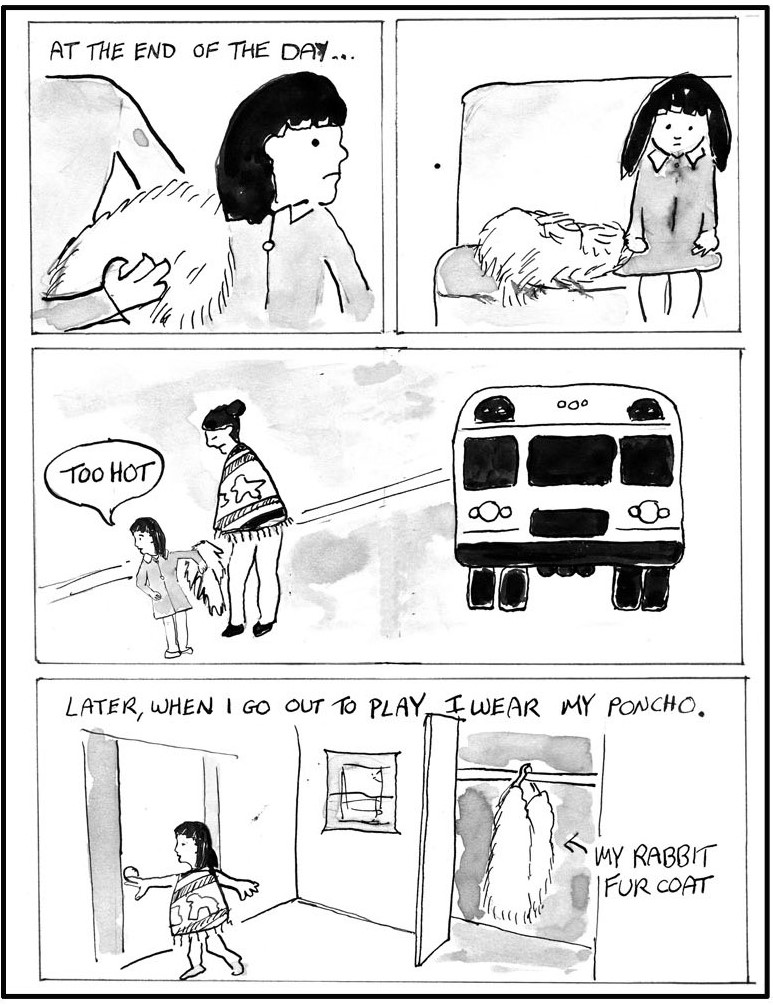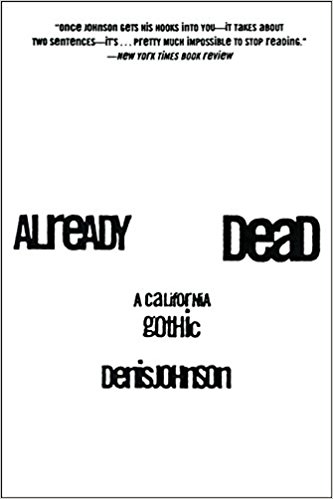Once there was a Dutchman, his name was Johnny VerBeck,
He made the finest sausages and sauerkraut and speck.
He made the finest sausages the world had ever seen,
Until one day he invented, the Wonderful Sausage Machine.
“The Ballad of Johnny VerBeck”
I
He has two problems. The first is a body-count. The second, well…
A silver phone buzzes in its holster on his belt. With surprising grace for a big man, he reaches to answer the call. “Parties to Go: Inflatables—how may I help you?” he says. A deep furrow creases his tan brow as he listens intently to the caller. The furrow deepens as he contemplates the request. “Yes, tomorrow, ten a.m.,” he says. “So you want the six-by-twelve, the dual-racer, and the fly-wall?” He listens again and starts nodding to himself. “For a last minute request like this, we charge a convenience fee of two hundred fifty dollars.” Another nod. This one was easy. Not like a lot of his clients. “Would you like to add our insurance package?” he says. “It’s another hundred twenty, but it provides coverage up to a million dollars in the event of a mishap.” He chooses the word carefully. He always chooses his words carefully. Brushing a large, dirt-stained hand through his shoulder-length red hair, he waits for the inevitable response. “No? Well, I’m sorry I can’t interest you in it,” he says. His voice, a soft, melodic tenor, is quite at odds with his physical appearance. Hulking well over seven feet, his customers are often startled when first seeing him, and then startled again when they hear his voice, like soft rain falling on a parched landscape. The dirt on his hands is another contradiction. Hands that look like his shouldn’t be able to play the piano with brilliance. They are hard hands, callused and cracked by labor. Works of love to be sure, but hard all the same. He has started to fade out of the conversation—the important work is finished, and he can answer the remaining questions with little thought. “Yes, we’ll be there. Nineteen-oh-two Schafenstraade Lane. With bells on, I promise,” he says. “Your daughter will never have a better party.” He ends the call and returns the phone to its semi-permanent home.
Turning his attention back to the party at hand, he spies Dad talking to Mom, who gives a weary headshake. He’s seen that look before. He’s seen every look before. As a party engineer (at least that’s what the nametag claims), he’s seen every version of every look on every kind of face. In stressful circumstances, people inevitably fall into predictable patterns. It bores him. Dad starts walking his way.
“Laurie said the kids said the bouncy house isn’t bouncing right,” Dad says.
“Yes, I noticed the back corner looks a little flat,” he says. “I can take a look, but I’d have to deflate the house for a few minutes. Let’s wait until it’s time for cake. I’d hate to ruin the kids’ fun.”
“Sounds like you’ve done this more than twice,” says Dad. “Thanks, Mr.-…”
Before he can answer, the phone on his belt rings again. “Sorry, I need to take this,” he says. He turns from Dad and begins the spiel once more. Dad walks back to Mom to report the good news. In the bouncy hut, the kids continue to shriek as they jump into one another and fall into laughing, squiggling heaps on the hut floor.
The hut is the biggest model Parties-to-Go carries: the fifteen-by-twenty. It’s called “The Castle”. It rents out at a whopping ninety dollars an hour, with a minimum of two hours guaranteed. Four crenellated castles adorn the corners of the hut, transforming it a mythical citadel. The towers are bright red, with golden spires topping them. Cheerful purple pennants adorn the spires, featuring pictures of knights and dragons. The interior of the hut is blue, with green trim around the corners. In the back left corner, a partially hidden staircase leads to the top of the slide which empties children onto the mat outside the hut. He notices that the kids are avoiding the slide for now, presumably because the floor isn’t as springy there as the rest of the hut. Bad design, he thinks. Bad planning. He is usually careful so that things like this don’t happen. He is usually meticulous. But the past few weeks, something has been changing. He’s caught himself slipping up from time to time. He assumes that it must be the workload—too much to do and too little time. He can accept this premise, but rejects the conclusion. He just needs to focus. Can’t make any mistakes now. Can’t afford that—not with business as good as it’s been. A particularly joyous shriek causes him to look up from his reverie. It’s Birthday Girl—Jill? Joy? Oh, yes, Julie. He smiles at her. “How’s the house Birthday Girl?” he asks. “Are you having a happy birthday?”
“Yeah. I love it,” Julie says. “Thanks, Mr.-…”
“VerBeck,” he says.
“Well, thanks Mr. VerBeck,” Julie says. “Can you come again next year?”
“Would you like me to?” he asks.
“Yes, please,” Julie says. She shyly curls a stray strand of brown hair behind an ear. The adorable look, he thinks. “But, Mommy says the hut is expensive and Daddy says we may not be able to pay for it.”
“Don’t worry, Birthday Girl,” he says, “I’m sure we can find a way to bring the castle back next year.” He loves the optimism and joy he sees on the faces of the children who attend his parties. He thinks of them as his parties, because after all, his gear is the main event. He has a heart for kids. It’s one of his quirks. Some days he wants to tell the customers about what they are really paying for. He refrains. He’s too busy, and business is too good.
Birthday Girl has left the hut, and gone to grab some punch at the picnic table. A Parties-to-Go party is always catered, but really, he knows the kids don’t care about the food, they just want to bounce. He loves seeing their smiling faces. It’s why he’s in the business after all. Well, that, and…
He sees Mom walk over to the picnic table carrying the cake. “Time for dessert,” Mom shouts, above the din. Little ones of all shapes and sized file toward the table from all over the yard. Once the cake cutting has commenced, he nods at Dad, and heads behind the castle. He does a quick check to make sure no kids are inside the hut. No sense in getting someone hurt, he thinks. Reaching under the hut’s skirt, he fishes for some duct tape and steel cable. “The Castle” has been acting up this week, and he wants to fix it as quickly as possible. On hands and knees, he crawls under the hut.
The world turns a dim blue as he makes his way to the sagging corner. Just as he suspected, the cables have come loose from their grommets. With deft movements, he re-tensions the cables. Using some duct tape, he finishes the work. He hates on-site repairs like this, but hates disappointing customers more. He crawls out from under the hut. Ducking through the mesh door, he bounces his way to the formerly sagging corner. He jumps several times, noting that the floor remains firm. Problem solved. Then it’s back outside to let Dad know the hut is fully functional again. Dad smiles that half-grin he’s seen so many times before. They are always thankful, and thankful to be out of a jam. Maybe Mom will give him mommy-daddy-special-time tonight after the party. Birthday Girl is glowing, after all.
After dessert, the kids clamber back inside the hut, although now their enthusiasm is diminished by cake-bloat. Many kids choose the slide over bouncing, and for the next forty minutes, a steady parade of little ones tumble onto the mat. Such diligent workers, he thinks. If this were his first rodeo, he supposes that he would be surprised by the strange end-of-party phenomenon that comes next, but, as an experienced hand, he merely notes it, and files it away. The phenomenon is this: very slowly, the children’s excitement and energy begin to ebb, as the first few parents arrive. As the party’s entropy increases, so too the number of parents. Not a parent himself, this seeming coincidence that is repeated at nearly every party seems to indicate a sort of telepathy between parent and progeny. But he is far too grounded to attribute much importance to this effect and dismisses it as a quirk of human nature.
At a certain point, the exodus reaches critical mass, and thereafter, the party is soon finished. Once everyone but Mom, Dad, and Birthday Girl are gone, he deflates “The Castle”. She, still shy, approaches. “Thank you.” Julie curls that same lock behind the same ear. He smiles.
“You’re welcome, Birthday Girl,” he says. “I hope your party was every bit as wonderful as you dreamed.”
“Oh, yes, it was,” Julie says, “It was the best day ever. I hope you come back next year.”
“I’ll be here,” he says. “Which reminds me, can you ask your Dad to come over for a minute?”
“I will,” Julie says, with a warm smile. It’s clear that he has won Julie over, as he has so many others before.
“Thank you, Birthday Girl,” he says, “and happy birthday.” Julie runs over to Dad, and repeats the request. Birthday Girl hugs Dad tightly in thanks for the party. Dad, looking much more at ease, saunters over to the deflating tent.
“Julie said you wanted to see me,” Dad says.
“Yes,” he replies. “Birthday Girl told me that she was worried that you couldn’t afford this hut next year.”
“Oh, that,” says Dad, sheepishly. “Well, Julie worries about the things I worry about, and money has been tight this year.”
“I have a discount for repeat customer,” he says. “I’m sure we can come to an arrangement.”
“That’s a very generous offer,” says Dad, looking humbled. It’s clear that Dad is waging a war inside. “If Julie wants a bouncy house next year, I will gladly take that deal.”
“Excellent,” he says.
“Thank you, Mr. VerBeck,” Dad says.
“I hope I don’t look old enough to be a ‘Mr.’ yet,” he says, “and you are most welcome. Birthday Girl seemed happy, and that’s what matters. Now, if you will excuse me, I will get this tent taken down, and get out of your way. I look forward to seeing your family next year.”
Dad walks back toward the house. Mom whispers something and Dad smiles and turns red. Must be that mommy-daddy-special-time, he thinks to himself as the tent continues to deflate. It’s all the same to him. Yes, he’s the hero of the day, but he’s too busy to bask in adulation or regret its absence. He still has to get back to base, fix this hut, and prep tomorrow’s newly added party. It will be another long night, but he loves this job, and wouldn’t have it any other way.
When the tent is fully deflated, he rolls it tightly and cinches it closed with rope. Can’t afford to have it bouncing around in the back of the truck. As he pulls out of the driveway, he notes that the family has gathered in the front room to play a board game. He thinks to himself that it’s the perfect end to a perfect day.
II
He pulls into the driveway at eleven o’clock in the evening. He shuts off the truck and it sputters to a halt. He looks up at the house, his own castle. A modest split-level, he has painted it eggshell with brown trim. The roof is covered in brown shingles which he installed himself last summer. The front door has a small frosted-glass insert, giving the entry a natural light.
He walks up the drive, looking at his lawn. He mowed yesterday but can see growth already. He will need to mow it again soon—can’t afford to have a messy lawn. A line of trimmed hedges borders the walk to the door. Everything is neat, orderly.
He enters the house and put his keys on a hook by the door. He sees a light on in the kitchen, as well as the living room. Strange, he thinks. He removes his boots and places them neatly on the mat beside the door. Can’t make a mess.
“I’m home,” he says.
Good.
He smells stewing meat before he crosses the threshold into the kitchen.
The room is stark, bright. Stainless steel countertops reflect the blazing fluorescent lights. In this room, no shadows exist. His eyes tour the room, from the stainless appliances to the glass-fronted cabinets. Overhead, pots and pans hang from steel hooks. The knives are organized in their block on the prep table. He is pleased to see that everything is in order. On the stove, a Dutch oven is resting on low flames, steam rising from it. Smells like loin, he thinks. He takes a deep breath, inhaling the scented air, and smiles. Loin is his favorite, and it is always a treat to come home to a finished meal, especially after such a long day. He is tired after working two parties and preparing for another two tomorrow. Stewed loin will be a perfect reward for a long day.
“How long until we dine?” he asks in the direction of the living room.
Not long.
“Side dish?” he asks.
Yes.
He moves to the pantry, grasps its steel handle and peers inside. Almost bare, the pantry reflects his busy schedule. However, in the bin on the floor, he sees a sack of fingerling potatoes. Perfect. He takes these to the sink, washes and scrubs them, and lays them beside the cutting board on the prep table. He dices them into thin slivers and sprinkles them with salt and pepper. He reaches overhead for a sauté pan, into which he pours some olive oil he pulled from a shelf on the prep table. He heats the oil and walks back to the pantry. He returns with an onion and a clove of garlic. The onion he slices as thinly as the potatoes, and the garlic goes into a press. He loves the flavor of garlic but hates the texture. Into the oil, he places the potatoes and onions. When they have turned golden brown, he presses the garlic over the pan, and relishes in the aromatics the oil releases as it sizzles in the heat. He allows the potatoes to cook for another minute before pulling the pan off the heat.
“I believe it is time to eat,” he says.
The table is set.
Carrying two trivets, he heads into the dining room, to find the table set. He places the trivets at even intervals. As he heads for the kitchen, he turns the lights on at their lowest setting—mood lighting for a sumptuous feast. Using gloves, he carries the sauté pan into the dining room, followed by the Dutch oven. He makes a final trip for a carving knife and fork and two serving spoons.
“Let us pray,” he says.
If you like.
“Bless us, Providencer, with the bounty of the world. Bless our coming and going. Bless the night in which we repose. Bless the servant and the master,” he prays.
That was lovely.
“It would be improper to partake without gratitude,” he says.
So it would.
“At work today, I made a Birthday Girl smile,” he says.
That is your gift.
“She was so lovely,” he says.
She will always be lovely.
“That is your gift,” he says.
Yes. Partake of the fruits of your labor.
He cuts into the loin, and juices squirt out onto the table. He runs a finger through the juice, before placing it slowly in his mouth. He sucks with great pleasure, savoring every drop. He spears a potato with his fork and lays it on his tongue. He can feel the crisp firmness, a perfect pairing for the juice he has tasted. He cuts a small piece of loin, and moans as the meat seems to melt on his taste buds. A trickle of juice slips from his lips and slides down his chin. He cuts another, larger piece of loin, no longer able to contain his hunger. He ravages the food before him, this offering of love. Fruits of his labor, how appropriate for so sweet a meal.
“I saw the special look again, today,” he says.
Speak not of such things in the presence.
“But you told me—,” he says.
Not in the presence of the Providencer. Never that.
“But I have been good,” he says.
Yes.
He quickly finishes his meal. He then carries everything into the kitchen, washes, dries, and replaces every item. Must keep things neat. He opens the stainless steel refrigerator and removes a birthday cake. Grabbing plates, knives and forks, he turns back toward the dining room, only to find the light turned off. He heads for the living room. A small fire is crackling contentedly in the neat stone fireplace. The flames cast intricate shadows on the Steinway in the far corner of the room. He turns off the lights, to better enjoy the fire.
“Time for dessert,” he says.
Cake is always delicious.
He cuts two pieces and serves the cake. The frosting is a creamy white, topped with a little fairy-tale castle and a princess figurine. He eats quickly, eager to move on to the next part of the evening.
“May I play for you?” he asks.
For a time.
“If I play well enough—…,” he says, trailing off.
Perhaps.
“Then I will play my best,” he says. He walks to the piano, pulls back the bench, and sits down. He closes his eyes. In his mind, he can see notes floating above a page of sheet music. He always sees it this way. From memory, his hands begin to play Chopin’s Nocturne No. 2, almost of their own accord. His head begins to sway to the notes dancing in his mind.
When he finishes, the notes in his mind shift, and he begins to play Beethoven’s Moonlight Sonata. Visions of Birthday Girl bouncing in the castle swim into his mind. She is beautiful there, jumping and laughing, reveling in her birthday. As he watches, she begins to pirouette, first slowly, then faster. As she twirls, she begins to change. She transforms into a dazzling, white rose. A single drop of red colors the center of the rose. It is perfect, flawless.
His hands stop moving as he reaches the end of the sonata. He takes a deep breath and opens his eyes.
“Did I play well?” he asks.
That was lovely.
“The music?” he asks.
The dream.
“Did I play well enough?” he asks.
Only for a moment.
“Thank you,” he says.
He stands up at the piano and pushes the bench underneath. Slowly, he walks across the carpeted floor and makes his way to the stairs. He pauses to catch his breath. It is always like this, he thinks. One hand on the railing, he walks up the steps, dreading with anticipation the reward to come. He reaches the door to his chambers and stops. A single candle is lit on the dresser. It casts pale shadows across the room.
Against the headboard of the bed, Emily is sitting, dressed in a cute little satin dress, green over white, wearing a party hat.
It’s been a long day, Daddy.
“Yes, sweetheart, it has,” he says. “And I’m tired.”
He changes into a pair of long, striped pajamas, and climbs onto the bed next to Emily. As he wraps his arms around Emily, her neck droops at a funny angle. He lifts the head of his beautiful, beloved Birthday girl, and places her head against his shoulder. Holding Emily, he starts to doze, and as he does, he has one last thought: the perfect end to the perfect day.

























